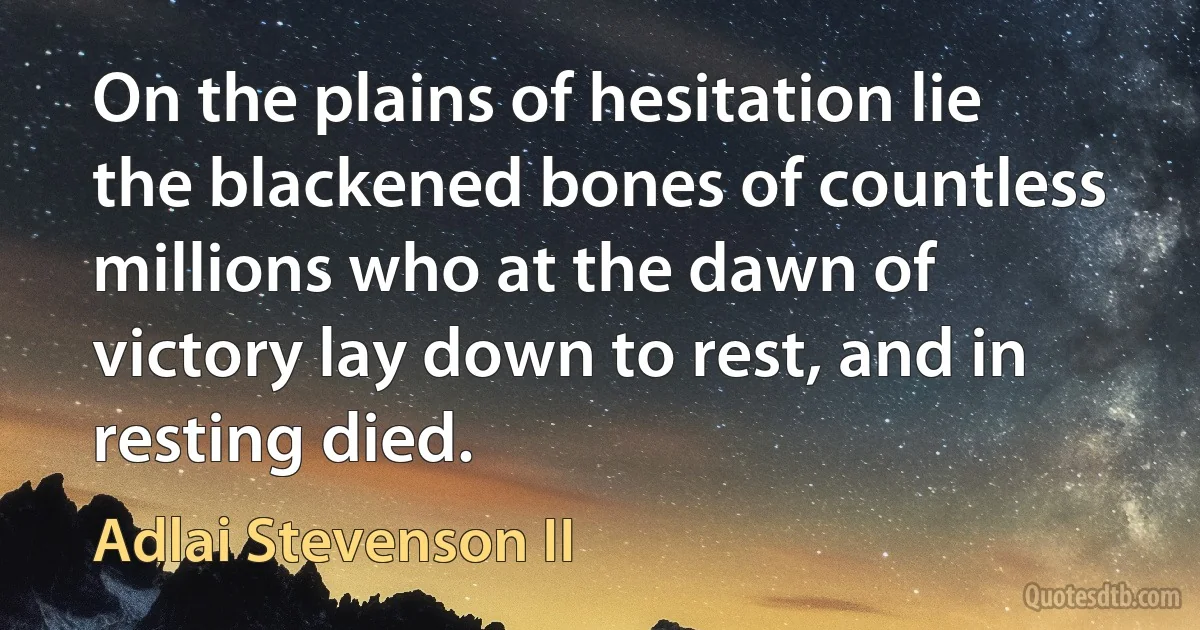Resting Quotes - page 2
Will moved on grimly, screwing up his eyes against the glare, ignoring the worsening pain from his hand, and finally reaching a state in which movement alone was good and stillness bad, so that he suffered more from resting than from toiling on. And since the failure of the witches' spell to stop his bleeding, he thought they were regarding him with fear, too, as if he was marked by some curse greater than their own powers.

Philip Pullman
"Who are you?" I asked the phantom,
"I am rest from Hate and Pride.
"I am friend to king and beggar,
"I am Alpha and Omega,
"I was councilor to Hagar
"But men call me suicide."
I was weary of tide breasting,
Weary of the world's behesting,
And I lusted for the resting
As a lover for his bride.

Robert E. Howard
The art of resting is a part of the art of working. A man who is tired and greatly in need of rest cannot do any good work. We are all familiar with those terrible mornings after sleepless nights when our brains refuse to function. It would be useless then to attempt to apply the principles of the art of working. Those principles presuppose mind and body to be in good condition. The human organism cannot live without alternating work and rest.

André Maurois
As we walked homeward across the fields, the sun dropped and lay like a great golden globe in the low west. While it hung there, the moon rose in the east, as big as a cart-wheel, pale silver and streaked with rose colour, thin as a bubble or a ghost-moon. For five, perhaps ten minutes, the two luminaries confronted each other across the level land, resting on opposite edges of the world.
In that singular light every little tree and shock of wheat, every sunflower stalk and clump of snow-on-the-mountain, drew itself up high and pointed; the very clods and furrows in the fields seemed to stand up sharply. I felt the old pull of the earth, the solemn magic that comes out of those fields at nightfall. I wished I could be a little boy again, and that my way could end there.

Willa Cather
One day when I'm walking and I see -- at first I thought maybe he was resting -- but I saw a big dead seal on the beach, which was really sad. However, the thing that I thought was puzzling was there was a couple, a young guy and a girl on a beach towel not 15 feet from this big, dead mammal, and I look up and they're waving at me, like, 'Isn't it a pretty day?' And I'm like, 'There's a big dead seal right there.' They're putting on lotion. It was just bizarre. And, curtain. I just didn't want to be at the beach anymore.

Megan Mullally
I saw my first Henry Darger collage/paintings in the early 1980's when the tale of Henry's life was just emerging through rumor and scattered fragments of his book. He lived and died a recluse in Chicago where no one knew of his writings or paintings. There was a folk art gallery in New Orleans that had acquired a small pile of Realms of the Unreal illustrations. I was on tour with REM at the time, Michael Stipe and I visited the gallery where we had a first look at these images of seven little horrified girls pursued by a purple and orange winged cats or evil professors on horseback or resting peacefully under giant sunflowers. I was completely captivated and intrigued.

Natalie Merchant
I have a message to the neo-Nazis, to the white nationalists, and to the neo-Confederates: Your heroes are losers. You are supporting a lost cause. And believe me, I knew the original Nazis, because you see, I was born in Austria in 1947, shortly after the Second World War. And growing up, I was surrounded by broken men, men who came home from a war filled with shrapnel and guilt, men who were misled into a losing ideology. And I can tell you: that these ghosts you idolize spent the rest of their lives living in shame and right now, they're resting in hell.

Arnold Schwarzenegger
It is admitted that the power of taxing the people and their property is essential to the very existence of Government, and may be legitimately exercised on the objects to which it is applicable, to the utmost extent to which the Government may choose to carry it. The only security against the abuse of this power is found in the structure of the Government itself. In imposing a tax, the legislature acts upon its constituents. This is, in general, a sufficient security against erroneous and oppressive taxation. The people of a State, therefore, give to their Government a right of taxing themselves and their property, and as the exigencies of Government cannot be limited, they prescribe no limits to the exercise of this right, resting confidently on the interest of the legislator and on the influence of the constituent over their representative to guard them against its abuse.

John Marshall
During the summer of 2012, one Ferguson police officer detained a 32-year-old African American man who had just finished playing basketball at a park. The officer approached while the man was sitting in his car and resting. The car's windows appeared to be more heavily tinted than Ferguson's code allowed, so the officer did have legitimate grounds to question him. But, with no apparent justification, the officer proceeded to accuse the man of being a pedophile. He prohibited the man from using his cell phone and ordered him out of his car for a pat-down search, even though he had no reason to suspect that the man was armed. And when the man objected – citing his constitutional rights – the police officer drew his service weapon, pointed it at the man's head, and arrested him on eight different counts. The arrest caused the man to lose his job.

Eric Holder
The statute in question cannot be justified by reason of the fact that the publisher is permitted to show, before injunction issues, that the matter published is true and is published with good motives and for justifiable ends. If such a statute, authorizing suppression and injunction on such a basis, is constitutionally valid, it would be equally permissible for the legislature to provide that at any time the publisher of any newspaper could be brought before a court, or even an administrative officer (as the constitutional protection may not be regarded as resting on mere procedural details) and required to produce proof of the truth of his publication, or of what he intended to publish, and of his motives, or stand enjoined. If this can be done, the legislature may provide machinery for determining in the complete exercise of its discretion what are justifiable ends, and restrain publication accordingly. And it would be but a step to a complete system of censorship.

Charles Evans Hughes
The issues raised in the historic conflict between Charles I, resting his claim to govern Britain on the divine right of kings, and Parliament - representing, however imperfectly, a demand for the wider sharing of power - concerned the use and abuse of state power, the right of the governed to a say in their government, and the nature of political freedom. The Levellers grew out of this conflict. They represented the aspirations of working people who suffered under the persecution of kings, landowners and the priestly class, and they spoke for those who experienced the hardships of poverty and deprivation. They developed and campaigned, first with Cromwell and then against him, for a political and constitutional settlement of the civil war which would embody principles of political freedom, anticipating by a century and a half the ideas of the American and French revolutions.

Tony Benn
![New space neither needs nor demands pictures - it is not a picture transposed on a surface. This explains the painters' hostility towards us [a. o.: Malevich ]: we are destroying the wall as the resting place for their pictures. (El Lissitsky)](https://cdn.quotesdtb.com/img/quotes_images_webp/01/el-lissitsky-hostility-needs-300301.webp)


